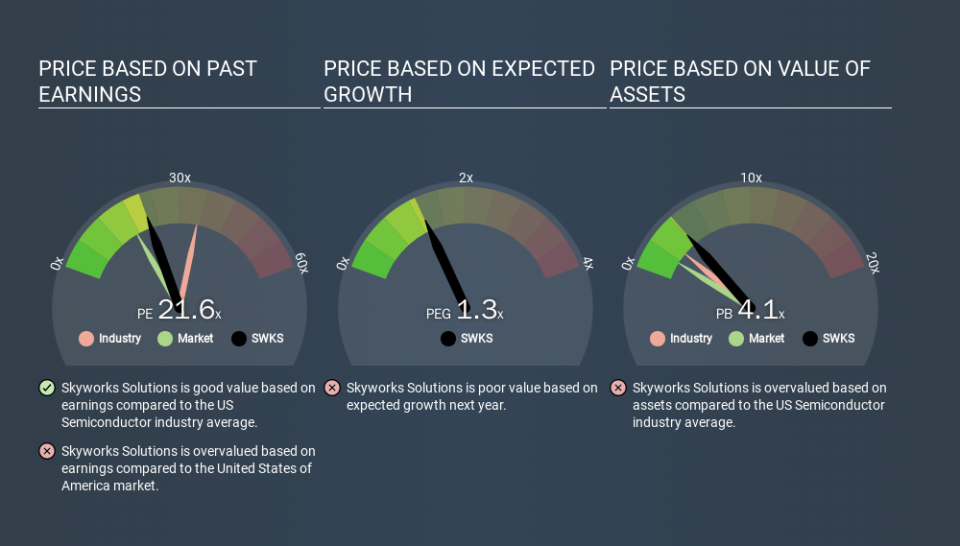Is Skyworks Solutions, Inc.'s (NASDAQ:SWKS) P/E Ratio Really That Good?

The goal of this article is to teach you how to use price to earnings ratios (P/E ratios). We'll look at Skyworks Solutions, Inc.'s (NASDAQ:SWKS) P/E ratio and reflect on what it tells us about the company's share price. Based on the last twelve months, Skyworks Solutions's P/E ratio is 21.61. That means that at current prices, buyers pay $21.61 for every $1 in trailing yearly profits.
View our latest analysis for Skyworks Solutions
How Do I Calculate Skyworks Solutions's Price To Earnings Ratio?
The formula for price to earnings is:
Price to Earnings Ratio = Share Price ÷ Earnings per Share (EPS)
Or for Skyworks Solutions:
P/E of 21.61 = USD103.81 ÷ USD4.80 (Based on the trailing twelve months to December 2019.)
Is A High P/E Ratio Good?
A higher P/E ratio implies that investors pay a higher price for the earning power of the business. All else being equal, it's better to pay a low price -- but as Warren Buffett said, 'It's far better to buy a wonderful company at a fair price than a fair company at a wonderful price'.
Does Skyworks Solutions Have A Relatively High Or Low P/E For Its Industry?
The P/E ratio indicates whether the market has higher or lower expectations of a company. We can see in the image below that the average P/E (35.0) for companies in the semiconductor industry is higher than Skyworks Solutions's P/E.
Its relatively low P/E ratio indicates that Skyworks Solutions shareholders think it will struggle to do as well as other companies in its industry classification. Since the market seems unimpressed with Skyworks Solutions, it's quite possible it could surprise on the upside. It is arguably worth checking if insiders are buying shares, because that might imply they believe the stock is undervalued.
How Growth Rates Impact P/E Ratios
Generally speaking the rate of earnings growth has a profound impact on a company's P/E multiple. Earnings growth means that in the future the 'E' will be higher. And in that case, the P/E ratio itself will drop rather quickly. A lower P/E should indicate the stock is cheap relative to others -- and that may attract buyers.
Skyworks Solutions's earnings per share fell by 24% in the last twelve months. But it has grown its earnings per share by 10% per year over the last five years.
A Limitation: P/E Ratios Ignore Debt and Cash In The Bank
Don't forget that the P/E ratio considers market capitalization. So it won't reflect the advantage of cash, or disadvantage of debt. Hypothetically, a company could reduce its future P/E ratio by spending its cash (or taking on debt) to achieve higher earnings.
Such spending might be good or bad, overall, but the key point here is that you need to look at debt to understand the P/E ratio in context.
Is Debt Impacting Skyworks Solutions's P/E?
Since Skyworks Solutions holds net cash of US$1.2b, it can spend on growth, justifying a higher P/E ratio than otherwise.
The Verdict On Skyworks Solutions's P/E Ratio
Skyworks Solutions trades on a P/E ratio of 21.6, which is above its market average of 17.1. The recent drop in earnings per share would make some investors cautious, but the net cash position means the company has time to improve: and the high P/E suggests the market thinks it will.
Investors have an opportunity when market expectations about a stock are wrong. If the reality for a company is better than it expects, you can make money by buying and holding for the long term. So this free visual report on analyst forecasts could hold the key to an excellent investment decision.
But note: Skyworks Solutions may not be the best stock to buy. So take a peek at this free list of interesting companies with strong recent earnings growth (and a P/E ratio below 20).
If you spot an error that warrants correction, please contact the editor at editorial-team@simplywallst.com. This article by Simply Wall St is general in nature. It does not constitute a recommendation to buy or sell any stock, and does not take account of your objectives, or your financial situation. Simply Wall St has no position in the stocks mentioned.
We aim to bring you long-term focused research analysis driven by fundamental data. Note that our analysis may not factor in the latest price-sensitive company announcements or qualitative material. Thank you for reading.



